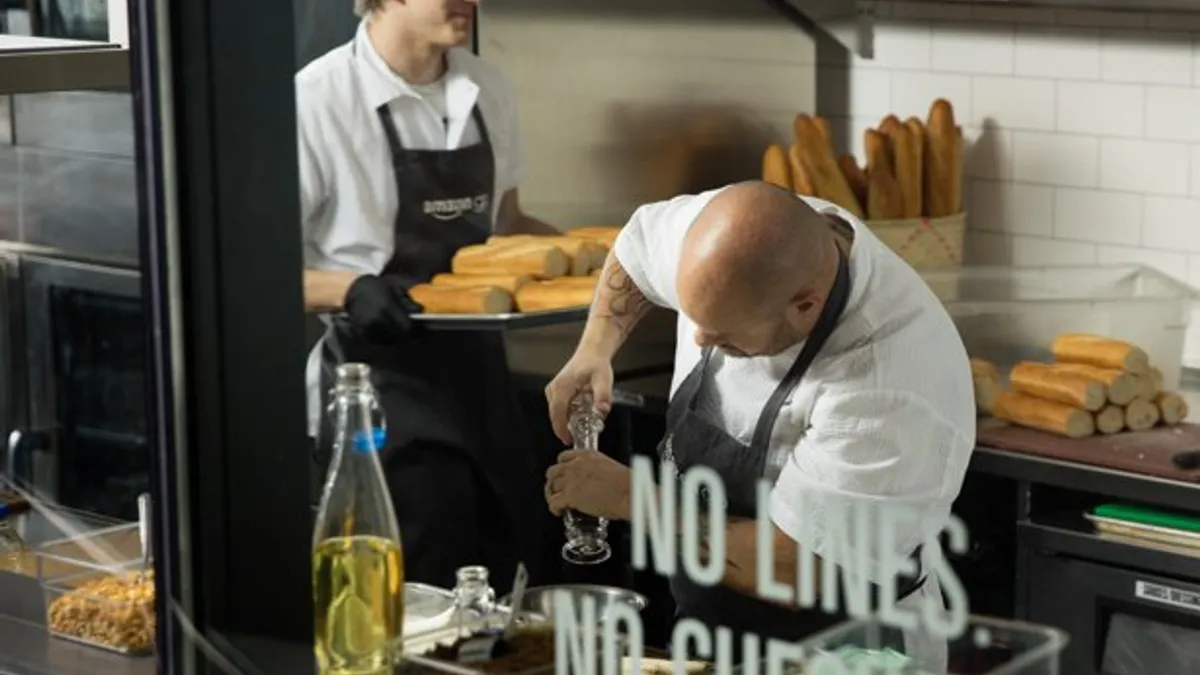Dive Brief:
-
The U.K. Intellectual Property Office on Friday approved Amazon’s application to trademark its slogans “No Lines. No Checkout. (No, Seriously.)” and “No Queue. No Checkout. (No, Seriously.),” according to a Bloomberg report. The European Union is also reviewing Amazon's application.
-
Late last year the e-commerce giant unveiled its first Amazon Go store in beta. The company described it as "roughly 1,800 square feet of retail space that is conveniently compact so busy customers can get in and out fast," and which has no checkout process, much less checkout lines.
-
The system leverages technologies used in self-driving cars, including computer vision, sensor fusion and deep learning, according to Amazon's website. At the moment, only Amazon employees have access to the store, though others can sign up to be notified when it’s available more widely.
Dive Insight:
Online grocery shopping is more advanced in the United Kingdom than it is in the U.S., so Amazon might see more success with its decade-long grocery efforts there than it has in the U.S. But the company would face brutal competition in the U.K. and Europe as well, if Wal-Mart's experience is any indicator.
The grocery space in general is something of a quagmire, beset by thin margins and complicated operations, and many of Amazon's efforts remain experimental. The U.K. in particular is in the midst of a grueling grocery price war, fueled by low-cost, no-frills grocery stores established there by German companies Lidl and Aldi. Wal-Mart’s Asda U.K. grocery unit and rival supermarkets Sainsbury, Tesco and Morrisons have been slashing prices to neutralize the German threat.
“There are phony price wars, and there are real price wars. This is a real price war,” Fraser McKevitt, head of retail and consumer insight at market research firm Kantar Worldpanel, told the Financial Times in 2014, adding that larger grocers were losing market share “hand over fist.”
Although the depressed post-Brexit British pound has slowed Aldi and Lidl's momentum somewhat, not much else has changed since McKevitt’s red flag. That has some analysts warning that Lidl and Aldi could do to Wal-Mart in the U.S. what they did to Wal-Mart in Europe.
Wal-Mart limped away from its German grocery effort in 2006, selling its 85 stores to homegrown German retailer the Metro Group at a $1 billion loss after an eight-year struggle to establish a beachhead there and losing hundreds of millions of dollars a year in the process. Asda has faced similar challenges in the U.K. market, with sales falling for seven straight quarterly periods as more shoppers head to Aldi and Lidl.
"[Asda] was the greatest division a few years ago,” Howard Davidowitz, chairman of New York retail consulting and investment banking firm Davidowitz & Associates, told Retail Dive. “Then Aldi and Lidl went across England, and now Asda is doing very badly.”
Amazon is hoping it can drive traffic to its stores by making the in-person grocery shopping experience convenient as it can through technology. But on both sides of the Atlantic, it faces fierce competition from mature, efficient players that have proven they can take on even the biggest food retailers.















